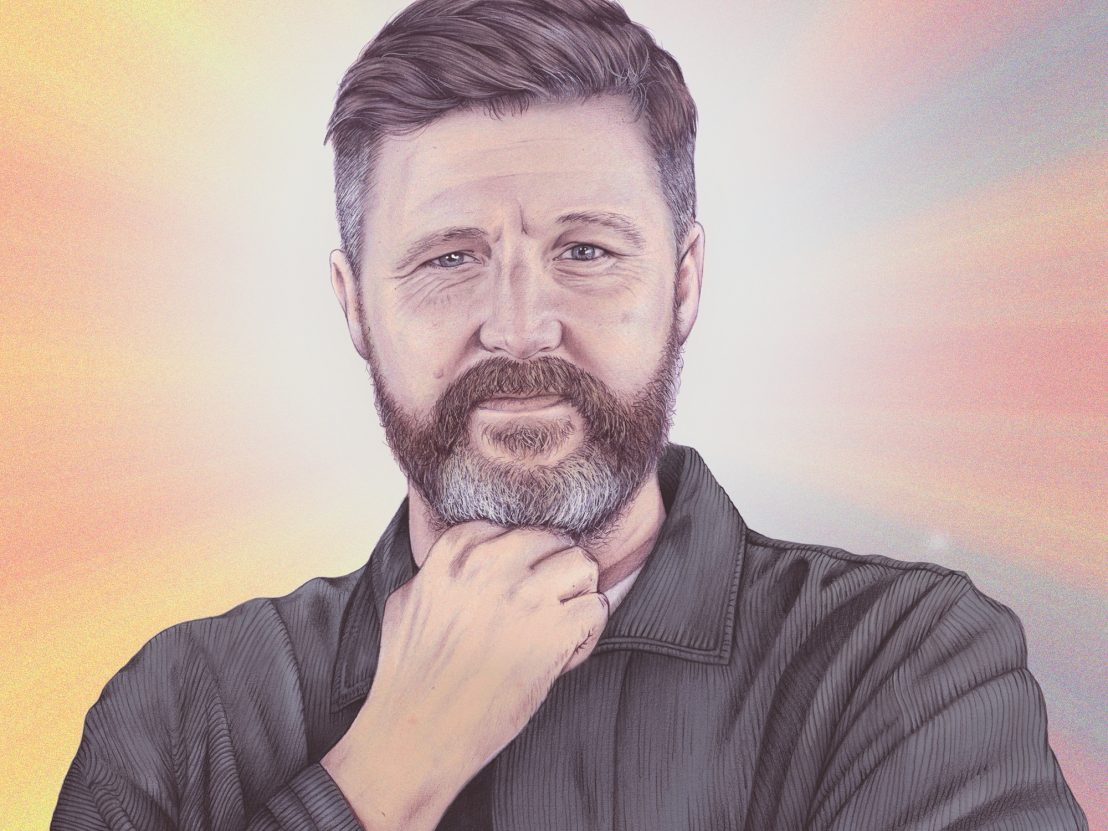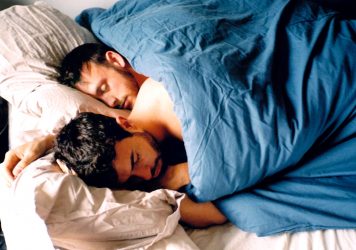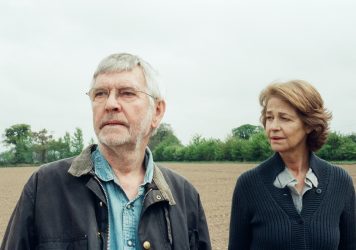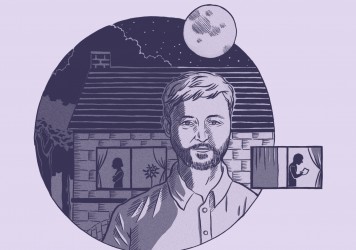
The British director on the power of crying and how he crafted his heartbreaking new film, All of Us Strangers.
Andrew Haigh is a veteran of film and television, having directed projects including Weekend, 45 Years, Looking and The North Water. His work is defined by an expert eye for detail and profound sensitivity – in All of Us Strangers, he excavates familial and queer trauma to create a powerful, tender, ghostly romance, starring Andrew Scott, Paul Mescal, Claire Foy and Jamie Bell.
LWLies: Every person I’ve spoken to about All of Us Strangers has had quite an intense emotional reaction to it. How aware of that potential are you when you’re making a film?
Haigh: It’s funny, because I used to get emotional writing the script, and then making a film, there are moments when you feel the emotion that’s coming back at you. I’m a pretty emotional person, I’m constantly crying. But then when I watched the assembly that Jonathan [Alberts, editor] had done, I was a wreck. And I know that he’d been a wreck editing it.
The more you work on a film, for months and months, you aren’t sure. You wonder if you’ve got rid of the emotion within the piece, if you’ve ruined it. When the film was finished, I hoped that people would have a reaction to it, and that it would feel like a genuine emotional reaction rather than a manipulative one.
I wanted to unpick the pain that we all carry around, in the hope that at the end, there is some catharsis. I find crying so cathartic. Every time I cry my eyes I feel so much better. I remember when Jonathan was cutting the dailies, and it was just one of the scenes about halfway through, of Harry and Adam in bed talking. I came in and Jonathan was just in floods. I said, “What’s the matter?!” It wasn’t a big emotional scene but he was a wreck.
I think that’s representative of how grief works, too. Sometimes it’s the small things that set you off, and it’s not always the things that make sense.
It’s always the little things, and it’s the same whether it’s grief or anything in your past. I think grief is not always just about someone you’ve lost, it’s about things that you’ve lost. It’s time that you’ve lost, it’s relationships that you’ve lost, it’s love affairs that you’ve lost. Our whole lives are essentially dealing with time moving on and us losing things. I wanted the film to be about that – so the mother is just as upset that she has lost the time with her son because those things are so fragile. I’m a pretty melancholic person, and so I often think about all of those little moments in life that have been so important and are now just distant memories. They are essentially ghosts.
It’s strange, I’m currently going through a lot of video footage from when I was a kid, so I’m having a very similar experience. It brings up so many strange emotions, excavating the past. Thinking about the people that aren’t in your life now.
Yeah – and the emotion that you have for someone once they are gone, whether that’s because they’ve died or they’re just not in your life..that emotion is still there. It’s strange how that works. Fear doesn’t last the same way. No other emotion does. But love is always there. Somehow it’s both a little bit cheesy and kind of magical at the same time. Love is the thing that remains.
Were you familiar with Taichi Yamada’s novel Strangers before you were approached about the project?
No, I hadn’t heard of it – Graham [Broadbent] and Sarah [Harvey], the producers, sent it to me. They knew me, and they asked what I was interested in doing, so I said “I’m kind of interested in doing some kind of ghost story.’ Even though this isn’t that exactly. But they sent me this very traditional ghost story, and the thing that I loved was this idea in the novel of meeting your parents again. I thought that was a fascinating way to start looking into love, grief, parental responsibility, all of those things. I very quickly knew I wanted to make the love affair between two men, and I didn’t want the ghosts in the story to be malevolent, in the way they sort of are in the book.
I felt like, Oh God, I can finally talk about queerness and family in a way that I think is very complicated, and do it within a way that these two things can be interconnected and wound up together. I feel like that is a thing about being queer. It is complicated within a family dynamic. It’s getting better every day, although not for everyone. But it was certainly so complicated for me, growing up.

I’m interested to know how much you thought about the connection between All of Us Strangers and your previous work, particularly 45 Years and Weekend, because there are overlapping themes.
Yeah, and I don’t mind it being sort of repeating, because I think my interests are always my interests. So the things I’m trying to articulate, I’m often going back on myself to try and find new ways to express something I’ve looked at before. I quite like that idea. But my biggest concern, actually, in the beginning, was that people were going to think this film is just Weekend with Ghosts. But even though I don’t think the film is that, everything that you do is always in relationship to what you’ve done before. For me anyway. It’s like picking up a conversation, there’s something that you’ve already sort of talked about, but you realise you want to talk about a little bit more, and in a slightly different way.
You’ve talked a little bit about bringing your own personal experience into the film. How do you find that process of weaving your own personal experience into an adaptation?
Yes, I felt like I had to. For some reason, I felt like I didn’t want to make the film unless it was personal. There was stuff I wanted to talk about in terms of queerness and how I feel about family and its complications, what it can mean to be a child and a parent. I wrote a lot during the pandemic – I kind of threw myself into trying to make it feel as close to something I understood as possible while making sure it wasn’t autobiographical. So there’s lots of me in it, but there’s also lots of me that isn’t in it. When I gave the script to people, they’d said “I feel like you’ve written this about me. I feel like you’ve told my life story.” Whether it’s about the loss of parents or the separation from family, or whether it’s about queerness…they’re taking something from it. And that was always what I hoped that it would feel like. It’s personal to me, but I want it to feel personal to everyone.
You have such a wonderfully curated collection of 80s music in All of Us Strangers. Was this directly plucked from your own experience?
Oh yeah, those choices were definitely personal. I love The Pet Shop Boys, I’ve loved them from their first album onwards back in 1985, and Frankie Goes To Hollywood. If you open the vinyl now, it’s so gay! You pull out this bit of paper, and they’re wearing like leather underwear and you’re like “How did this exist in 1983?” Those songs were so important to me. But pop music in general is a way for especially repressed British people to express themselves – the old pop songs especially expressed the things that we can’t say in very blatant terms. I think weirdly my politics was forged by pop music. I listen to a Housemartins song now, and I can tell they’re a bunch of socialists, you can feel it. Everything was passionate in those days, especially in pop music.
The film begins with a sunrise and ends with a night sky which lingers, and I loved that parallel. How early did you have that ending in your head?
I think it was there from the beginning if I’m honest – but I’m also aware that the ending won’t work for everybody. For me, it’s like I needed the ending to transcend a sense of reality. When I was a kid growing up I genuinely thought that I would never be able to find love. I couldn’t even see spending my life with another man as a possibility. And I wanted in the end to make love have this almost cosmic importance. Like the idea that love is so fundamentally important and enormous. Someone said something to me that I hadn’t quite realised – stars die billions of years ago, and the light is still there millions of years later. It’s like we said before; love is this thing that can be long gone, but it’s still there. And you can find it again. And again. And again. It’s always there.
Published 22 Jan 2024

By Paul Weedon
A remarkable feature debut from Andrew Haigh signals an exciting new voice in LGBT cinema.

Charlotte Rampling and Tom Courtenay are on top form in Andrew Haigh’s devastating relationship drama.

The director of Weekend and 45 Years talks to LWLies about how he creates authentic, lived-in characters.